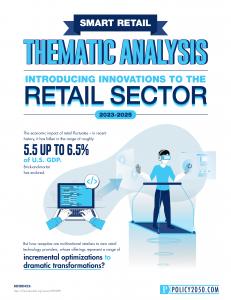Policy2050 Releases Groundbreaking Report on Smart Retail Technologies, Partnerships, and Future Trajectories
The report sheds light on the innovative partnerships between retail tech startups and industry giants that are shaping the future of shopping.
SAN FRANCISCO, CALIFORNIA, USA, May 3, 2023/EINPresswire.com/ -- Policy2050, a tech-focused market research and consulting firm, has released a new comprehensive report exploring the world of “Smart Retail” technologies. The report delves into the strategies employed by retail technology startups as they establish partnerships with major retailers and achieve product/market fit.
The primary research process directly engaged founders and experts from across Smart Retail in comprehensive, roughly hourlong Zoom interviews. The average total funding amount of participating startups is approximately $28.73M. Founders’ unique value propositions ranged from a platform that connects brands with retailers and marketplaces to a frontline employee incentives management platform and a maker of dark store nano-fulfillment centers. Despite the diverse nature of these startups’ solutions, many founders encountered similar hurdles and developed similar tactics when establishing partnerships with major retailers.
Retail technology innovators that participated include:
• 1MRobotics
• BrainBox AI
• Cymbio
• Renovai
• SparkPlug
• The Center for Education and Research in Retail
• Vibes
Retail technology providers often have to navigate a complex web of information and relationships to work with retailers. Startups must adjust their ideal customer profiles and iterate, or even dramatically pivot, based on new information. Meanwhile, retailers must routinely and honestly reassess their operations, then digitize or otherwise modernize any processes found to be lacking. The retailer’s challenge involves filtering through pitches and possibilities, identifying technologies that would help to generate profit or cost savings, or measurably address clear signals of consumer demand.
The Policy2050 report offers valuable insights into how retail technology startups can successfully partner with well-established retailers and brands to streamline and enhance the shopping experience. The report identifies factors that contribute to the relatively slow pace of technological adoption in brick-and-mortar retail, such as entrenched legacy systems, the complexity and variability of large retail organizations, the siloed nature of innovation labs, concerns about data security and technology provider incentives, and the downtime associated with big rip-and-replace projects. And yet, there are signs of Smart Retail growth. Consumer behaviors shifted during the pandemic, forcing retailers to align with new habits and expectations.
“Startups need to find the right executive sponsor or champion within the retailer’s organization and match solutions with defined KPIs,” concluded David Pring-Mill, founder of Policy2050 and author of the report.
He continued, “As the implosion of Bed Bath & Beyond showed, retail is at a crossroads. Innovating in retail isn’t just about technology—it’s about breaking through barriers, transforming mindsets, and building bridges between startups and retailers.”
This thematic research focus aims to encourage improvements across the retail industry, which, in the United States alone, directly employs 32 million workers and supports even more jobs through supply chain relationships, according to the National Retail Foundation. Research findings were articulated through startup case studies, other textual descriptions, strategic bullet points, infographics, and imagery.
The report’s recommendations included the following advice for retail technology startups approaching retailers:
• When approaching retailers, Smart Retail startups have found success by presenting case studies with look-alike customers and customizing pitches around the prospects’ organization as well as their individual roles or KPIs within that organization, addressing any unique pain points. Targeting retailers with innovative organizational cultures makes sense, though innovation labs sometimes lack the internal influence and leverage required to initiate projects or change.
• Typically, for a new retail technology to be adopted, there must be an obvious path for it to either generate profit or save money for the retailer. Therefore, Smart Retail startups should lead with a strong value case to gain retailers’ interest. If a product or service can be easily explained and has evidence to back it up, it is more likely to gain traction and be shared with the right people within a large organization.
• Pilot tests or annual contracts with defined opt-outs can be useful for initiating tech adoption and partnerships. This allows retailers to meaningfully A/B test a technology or platform and assess its value to their operations.
• Multiple retail technology providers agreed that ROI calculators, numerical estimates, and other such claims don’t resonate with skeptical or desensitized prospects as powerfully these days as case studies with look-alike customers.
• By showcasing a scalable technological solution with a measurable environmental, social, and governance (ESG) impact, retail technology providers can enable large retail organizations to adhere to their professed goals, which may be subject to growing accountability from consumers, shareholders, and regulators.
• Even when the technology in question has a strictly business motivator, internal champions within retail organizations can help to generate excitement and drive adoption. These aren’t just executive sponsors; sometimes, they’re mid-level managers with deep organizational knowledge and agility.
• Retail technology providers that could be characterized as “platforms” told Policy2050 that rather than targeting retailers directly, they have experienced more success by forming those retailer partnerships indirectly after first onboarding consumer brands and leveraging their existing relationships. This could be seen as a testament to the power of lateral thinking, social proof, direct referrals, and network effects. Inconsistency in the retail sector around job titles and responsibilities is another factor pushing Smart Retail providers in the direction of consumer brands that know and understand these retailers already.
• Retail technology providers sometimes must take on upfront risks, such as conducting due diligence and free audits of a prospect’s organization, to secure large contracts and long-term business relationships that may include long-tail pricing.
The report, titled “Smart Retail: Thematic Analysis — Introducing Innovations to the Retail Sector (2023-2025)”, is now available for purchase on Policy2050.com.
About Policy2050
Policy2050 is a market research and consulting firm dedicated to influencing the future of tech policy and business strategy for a sustainable, fair, and vibrant economy. Through forward-thinking analysis, inclusive of market research, management consulting, and policy guidance, Policy2050 inspires positive directions in sectors undergoing significant technological disruption. With the newly released 2023 Smart Retail report and the preceding report from 2022, entrepreneurs and executives can unite around a shared vision of a more dynamic, connected retail ecosystem.
David Pring-Mill
Policy2050.com
david.pringmill@policy2050.com
Visit us on social media:
Twitter
Legal Disclaimer:
EIN Presswire provides this news content "as is" without warranty of any kind. We do not accept any responsibility or liability for the accuracy, content, images, videos, licenses, completeness, legality, or reliability of the information contained in this article. If you have any complaints or copyright issues related to this article, kindly contact the author above.



